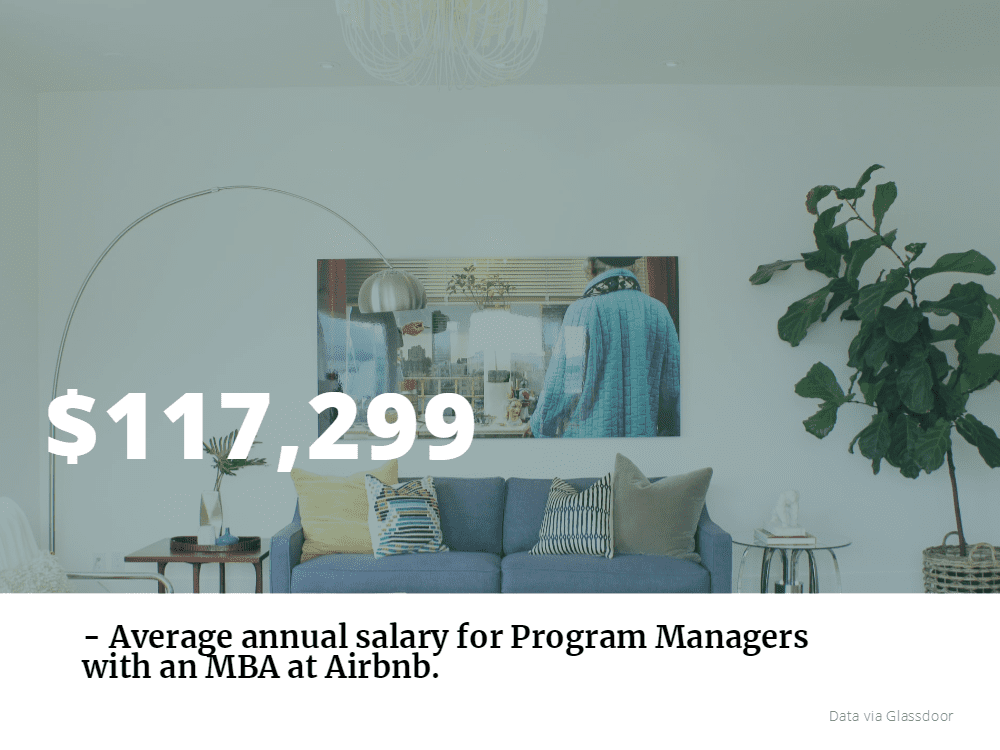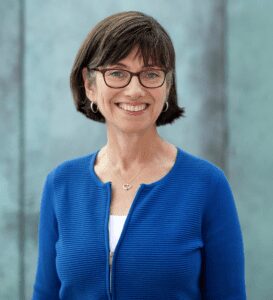Top MBA Recruiters: Airbnb

One of the great clichés of the tech industry is the notion of “disruption.” As in, nearly every app, website, or program will disrupt the way we previously conceived of our environment. All this talk of disruption in tech often amounts to a lot of hot air, but not so for Airbnb.
Initially founded as a way for two guys to earn a bit of extra income to cover astronomical San Francisco rent, Airbnb has become a leader in peer-to-peer property rental. Millions of people use the service each year to find temporary lodging in virtually every nook across the planet
As Airbnb’s popularity soars and the company continues to expand its services—it recently acquired HotelTonight, a discount hotel booking service—MBAs with interest in hospitality should consider these Airbnb careers.
Why MBAs Love Airbnb
Airbnb is a young company, launched in 2008. In that short time, it has established itself as a power player in the hospitality industry. With an IPO in the pipeline this year, the company is working to shore up its future. This means further expansion into new markets and new services to maintain company profitability. MBAs who long to play a vital role in the expansion of an already hot brand will find opportunities in spades at Airbnb.
Airbnb compensates MBAs well for their contributions. According to Glassdoor, MBAs who arrive as program managers can earn an average of $117,299 in base salary and $18,868 in a cash bonus. Those who receive stock bonuses can earn an extra $32,669.

In addition to the salary, Airbnb careers have excellent benefits. Employees will find health care, dental care, 401(k), life insurance, and a complimentary snack pantry on pair with most Silicon Valley startups. However, Airbnb offers a few other unique perks.
To start, the company provides stipends to its employees to cover cellphone bills, continuing education, and commuting, whether by bike or by public transportation. In addition, Airbnb provides its employees with a $2,000 travel stipend to stay in any Airbnb property in the world, which essentially gives Airbnb employees gratis accommodations wherever they travel during their three weeks of annual PTO.
Life at Airbnb
One might gather that Airbnb encourages its employees to maintain a healthy work-life balance, which many employees have remarked is actually quite easy. Airbnb employees also seem to enjoy the company of their coworkers, who are often described as thoughtful, intelligent, and nice.
The company has a lenient telecommuting policy. However, most employees come into the office because the provided spaces are worthy of spreads in Architectural Digest. Airbnb hires local architects to customize each office to its city. The employees have noticed; many note that the gorgeous offices are a major benefit of working for the company.
Airbnb Careers
The firm has four core values:
- Champion the Mission
- Be a Host
- Embrace the Adventure
- Be a “Cereal” Entrepreneur
Successful candidates will be able to explain how their skills and talents fit with these core values.
The interview process for the product manager position starts with a phone interview. If approved, candidates will venture to the Airbnb office for a full day of interviews and examinations. This includes case study presentations and multiple interviews. If the company considers you a fit for its company, it will extend an offer.
As noted above, cultural fit is extremely important at Airbnb. The company encourages candidates to set aside some time to consider how they might contribute to the culture at Airbnb. The company recommends making contact with a current employee to help gather information on what Airbnb expects regarding its core values.
5 Questions with the Senior Associate Dean of MBA Programs at BU Questrom

In our latest installment of the MetroMBA “5 Questions” series, we speak with Barbara Bickart, the Senior Associate Dean of MBA Programs at Boston University’s Questrom School of Business. Bickart talks about the qualities MBA candidates possess, unique opportunities for MBA students, and things to do in Boston.
1. Why should an MBA candidate be excited to apply to Questrom?
“I believe three main factors make our program unique.
First, Questrom has a strategic focus on three sectors that we have identified as drivers of growth in our economy—digital technology, health, and social impact. We have developed unique program offerings as well as vibrant communities around these three sectors, and many of our students participate in one of these programs.
Second, our program is designed so that students can obtain a deep base of functional knowledge and key skills, and start their elective courses in the first year. Our first year is divided into four, seven-week modules. In the first three modules, students take three classes and complete an integrated experiential project. For example, in Mod 3, students take Strategy, Information Systems, and Organizational Behavior while working on a client-based project that addresses strategic issues in one of our three sectors. Through this process, students learn to view and solve problems from a multi-disciplinary perspective. Students can start taking elective courses during Mod 4.

Barbara Bickart is an Associate Professor of Marketing and Senior Associate Dean for MBA Programs.
Finally, Boston is a great place for students studying business, with a vibrant culture around innovation and technology. Our project-based learning draws on the Boston eco-system, and many of our students end up working in Boston or the immediate area.”
2. What type of MBA candidate is the best fit for Questrom?
“Our students come from a variety of backgrounds and experiences. In addition to being smart, intellectually curious, and engaged, the two traits that I would say best characterize our students are that (a) they care about community and the impact of their work on society and (b) they are agile and creative—they are flexible in how they think about and solve problems and look outside the box for solutions.”
3. How does Questrom stay on the cutting edge of MBA education? Is there a unique feature you can highlight?
“We are constantly evaluating and updating our curriculum, with a particular focus on adding more experiential learning opportunities in our courses and co-curricular experiences. Our faculty’s research often drives our elective courses. For example, one of our most popular elective courses is Platform Strategy. This course was developed by Professor Marshall Van Alstyne and is based on his book Platform Revolution: How Networked Markets are Transforming the Economy and How to Make the Work for You (2016, W.W. Norton and Co). In this course, student teams work on consulting projects for major platform-based companies. Past projects have been sponsored by Airbnb, Allstate, Capgemini, eBay, edX, Jawbone, Haier, Huawei, Mahindra, Pearson, PGA, PTC, Siemens, SAP, startups, and many others.”
4. What unique opportunities outside of the MBA curriculum make Questrom stand out?
“Our student community is active and engaged—there is always something going on here at Questrom. Students take advantage of the Boston ecosystem—attending networking events and conferences, for example, in health and life sciences. Questrom students are also involved Innovate@BU, which is a BU-wide initiative supporting student-led innovation and entrepreneurial activities. Students take advantage of the Build Lab IDG Capital Student Innovation Center, which is an on-campus co-working space for collaboration and new ventures. The Questrom School of Business Internship Fund provides financial support our students interested in exploring internships at not-for-profits. Finally, we offer a number to global learning opportunities, both in our curriculum and via student-run trips. Groups travel to Paris to study luxury marketing, South Africa to study social impact, Israel to study entrepreneurship, Vietnam to study manufacturing, and Silicon Valley to learn more about digital technology.”

“The views of Cambridge and Boston are amazing. I particularly love walking along the Charles during the Head of the Charles rowing races in October,” Bickart says.
5. What’s your favorite activity in Boston? Why?
“My favorite activity in Boston is to walk along paths on the Charles River. From my office, it takes just a few minutes to get to this path. The views of Cambridge and Boston are amazing. I particularly love walking along the Charles during the Head of the Charles rowing races in October. The races are exciting and fun to watch, and there is a lot of energy in the crowd.”
Marketing Magic, The Business of TV, and More – New York News

Let’s explore some of the most interesting stories that have emerged from New York business schools this week.
Magic and the Modern Business World – Gabelli Connect
Gabelli School of Business Clinical Associate Professor Timothy Malefyt uses capital-M ‘Magic’ (think David Blaine, Siegfried & Roy, Penn & Teller) to explain how “magical practices can be found in contemporary capitalist societies.”
In his new book, Magical Capitalism: Enchantment, Spells, and Occult Practices in Contemporary Economies, Malefyt explains, “Magic offers a way to make a connection and effect change through willful beliefs and ritual practices.”
He elaborates:
“[In advertising] you don’t know if the customer will like this ad so similarly to how magicians rely upon magical rites, advertisers often use “formulas” to feel comfortable in their presentation to a client, such as habits surrounding the time they present or the way everyone is sitting at the table.”
You can read more about Malefy’s work here.
Binghamton University Student Approaches TV Production with Business Mindset – Binghamton SOM Blog
The Binghamton SOM Blog recently profiled business administration student Zach Homler, who has made significant early strides toward a promising career behind the scenes of film and television.
Following an internship on the Fusion and truTV variety talk show The Chris Gethard Show in which he “helped prepare celebrity guests such as Jason Sudeikis, Seth Meyers, Nick Kroll and Ellie Kemper,” he landed back-to-back PA (production assistant) gigs on Netflix and Amazon Prime shows.
Homler compares his experience to a case competition. “You have this project or this problem to solve, and you do some work, weigh your options, then present your recommendations to the decision makers.”
Homler hopes to pursue a career in either in entertainment law or talent management.
“This is me getting my foot in the door. I’m able to get that ground-up perspective of what goes into these productions, and I think putting in that work and understanding the day-to-day process is only going to help me on the business side of things. And so far, it’s been a lot of fun.”
You can read more from the recent interview here.
Fred Schaufeld Talks about Luck, Opportunity and Lehigh – Lehigh College of Business and Economics News
As part of its Distinguished Finance Speaker Series, the Lehigh College of Business and Economics recently hosted Fredrick D. Schaufeld (’81 ’15P ’17P), whose presentation Managing Luck: Lessons from Lehigh and Life When Not Everything Goes Quite as Planned contained many hard-won lessons from his career as Co-Founder and Managing Director of venture capital private equity firm SWaN & Legend Venture Partners.
Schaufeld offered three major takeaways for the audience:
- Failure does not equal death. “Wherever you are in your career, you’re building a portfolio of ideas, relationships, networking and skill sets. When you fail, you might go back a little, but you can build on that and keep going forward.”
- Your time is worth more than your money. “If you’re miserable, do it a different way or do something else.”
- Don’t wait for wisdom to find you. “You’re wealthy now, whether you realize it or not. I learned that at a relatively young age, with no money in my pocket.”
Schaufeld explains, “[SWaN & Legend] invest in special human beings who lead companies with social impact. Ethics mean a lot to us. We focus on companies people are passionate about,” such as KIND Healthy Snacks, Gwynnie Bee, Airbnb, Sugar23, the Washington Nationals, Washington Capitals, and the Professional Fighters League.
You can read more about the recent event here.
Notre Dame Startup News, and More – Chicago News

Let’s explore some of the most interesting stories that have emerged from Chicago business schools this week.
Mendoza MBA Student’s Tech Startup Secures $600K Investment – Mendoza Ideas & News
Notre Dame University’s Mendoza College of Business recently profiled current student Cory Bailey ’18, whose startup SecūrSpace is to trucks and shipping containers what Airbnb is to housing.
Bailey explains that SecūrSpace, which recently secured a $600,000 investment, attempts to provide an effective solution to the issue of temporary storage sites outside of normal shipping routes.
It’s not uncommon in the shipping world for trucks to tack on an additional 50-mile trip to a temporary storage site, Bailey explained to Mendoza Ideas & News. “And so these trucks are taking these containers way outside of L.A. and New York and other port cities because they’ve got nowhere to put them,” he said.
Thanks to the aforementioned donation, which mostly came from a Notre Dame alum, Bailey hopes to expand his project in the near future.
You can read more about Bailey and SecūrSpace here.
How a Room’s Lighting Shapes Our Decisions – Kellogg Insights
Northwestern University Kellogg School of Management assistant professor of marketing Ping Dong and Feinberg School of Medicine associate professor of psychiatry and behavioral sciences Dorothy Sit recently published new research that explores how a simple thing like lighting “can change how likely we are to make pleasurable versus practical decisions.”
Dong writes, “Ambient light is a very important experience that is easily manipulated. This shows a new psychological consequence of darkness—consumers more often choose the option that provides immediate pleasure.”
According to the article, there’s a very real possibility that “consumers are also more likely to make pleasurable choices in darker settings—reaching for a candy bar instead of an apple, or buying trendy high heels instead of practical flats—not because they feel physically hidden, but because that feeling of psychological distance frees them to do what they really want.”
You can read more about the duo’s curious research here.
Linking Sustainability, Corporate Governance, and Gender – Quinlan School of Business Blog
Starting next month, Quinlan School of Business management professor Anne Reilly will present ongoing research into “significance of gender diversity in corporate sustainability governance” at several international conferences this year.
Reilly explains that for the second paper, she and her team found that “almost half of the companies studied have at least one person as a designated sustainability leader, and over 50 percent of these leaders are women—compared to the typical 25 percent representation of women executives.”
She elaborates, “Companies are continuing to develop governance roles dedicated to sustainability, and this accountability should strengthen their strategic emphasis on this critical issue. Further, the presence of women leaders as active change agents for sustainability supports progress in gender diversity and inclusion in executive governance.”
Read more about Reilly’s research here.
What is the Most Valuable San Francisco MBA?

There’s no doubt: San Francisco is a great city to earn your MBA. Located near Silicon Valley, business schools throughout the area provide not only an excellent education but also opportunities to interact with many tech and industry leaders in the area. But which MBA programs in San Francisco are the best?
This is not an easy question to answer. You can check rankings, to see which MBA programs perform well based on surveys and statistics provide to The Financial Times, U.S. News and World Report, and The Economist. And that’s a great place to start, but probably the most essential value when determining the right MBA program for you is your return on investment (ROI).
The ROI of an MBA program is one of the best indicators of what your MBA is actually worth. It looks at statistics such as average salary increase, post-graduation employment, tuition cost, cost of living, and more. To help you out, we looked in-depth at the best business schools in San Francisco to see which offer the best ROI. Continue reading…
Haas Sharing Economy Study Explores How Manufacturers Can Adapt

New working research from the Haas School of Business at UC Berkeley suggests that the sharing economy might actually be more beneficial to manufacturers than previously thought.
